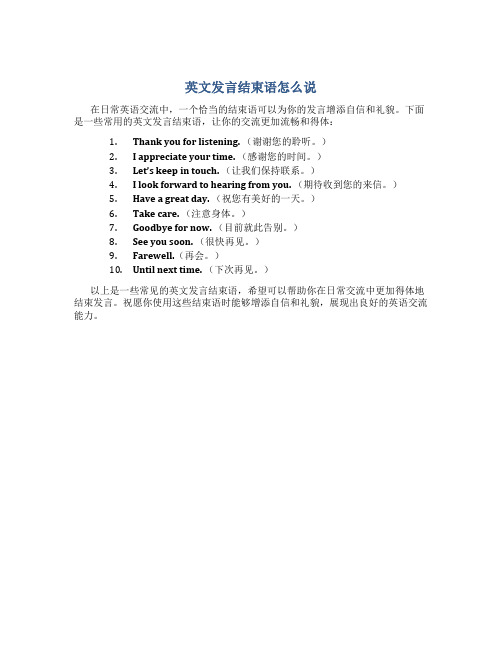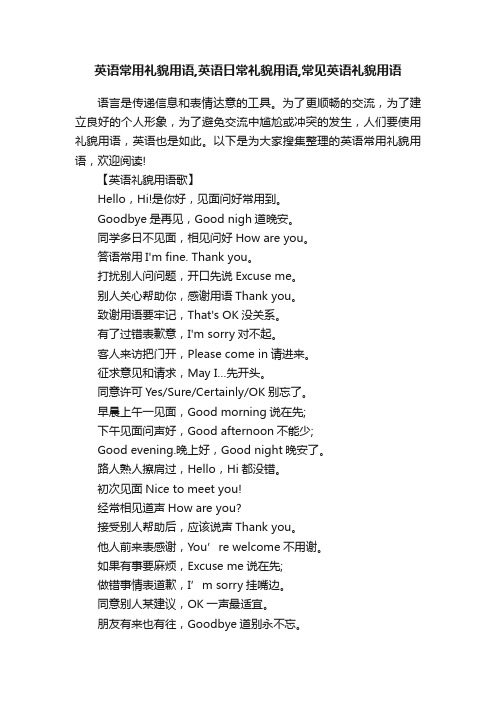礼貌结束尬聊的实用英语口语(最新)
礼貌结束尬聊的实用英语口语

【导语】⽆论在何种情况下,作为⼀名好的健谈者都是⾮常重要的,⽆论是商业、还是社交或是约会。
以下是由整理的礼貌结束尬聊的实⽤英语⼝语,⼤家千万别错过。
【篇⼀】礼貌结束尬聊的实⽤英语⼝语 01. “尴尬”是awkward还是embarrassing? 在⾯对⾯的交谈中,我们时常会遇到这样⼀种情形:⾃⼰有事要离开,⽽对⽅还在滔滔不绝地讲话,这时候如何尴尬⽽不失礼貌地结束这段对话就成了⼀个棘⼿的问题。
还有些时候,对话本⾝就很尴尬,这时候就更需要巧妙地结束这场谈话了。
Awkward和embarrassing都可以表⽰“尴尬”,那⼆者有什么区别呢? Awkward有uncomfortable的意思,⽽embarrassing可以形容让你脸红的事情(when your face goes red)。
再⽐如,如果男⼠不⼩⼼⾛进ladies’ room(⼥洗⼿间),那就可以说embarrassing。
很多⼈都害怕空⽓突然安静,你可以说: 还有⼀些awkward topic,⽐如⼩孩从哪⾥来的问题。
另外,awkward还可以形容⼈,表⽰“笨拙的”。
02. Actions to end a conversation 有时⽆声胜有声,你可以⽤⼀些⾏为来结束对话。
你可以表现得很忙碌,⽐如look at your watch,move your body away或者look at your feet。
很多⽅式都可以暗⽰对⽅你想要离开: 结束对话的时机也要选择好,你可以wait for a lull。
03. Phrases to end a conversation 如果对⽅注意不到你的肢体语⾔的话,你就要⽤语⾔来表达你的⼼思了。
⾸先,你可以讲⼀些关于future plans的话: 切记,如果对⽅跟你说了这些带有someday, sometime的话,你千万不要问:“when?”因为对⽅只是想结束这次谈话⽽不是要跟你约时间。
如何用英语礼貌结束通话

如何用英语礼貌结束通话1. I've really got to go, I'll get back to you when I get the office。
我真的得走了,我进办公室再打给你。
2. Sorry, I must end the conversation. There's someone on the other line。
抱歉,我不能再说了。
有另一人在线。
3. Sorry, I've got to hang up. My wife's waiting for me。
抱歉,我得挂电话了。
我老婆在等我。
4. I think I'd better let you go. I'll talk to you later。
我想我应该让你去忙了,我晚点再打给你。
5. I have to get back to work. I'll call you later tonight。
我要回去工作了。
我今晚再打给你。
6. Shall we continue this later? I've got a call waiting。
我们可不可以晚一点再继续谈?我有插播。
7. It's kind of late. Why don't we talk about it tomorrow?有点晚了。
我们何不明天再谈呢?8. I've got to meet a client right now. Can we talk later?我现在要去见一个客户。
我们可以晚一点再谈吗?9. I won't keep you any longer。
我不耽误你时间了。
10. Sorry, it's getting late. Can you call again tomorrow morning?抱歉,时候不早了。
英文发言结束语怎么说

英文发言结束语怎么说
在日常英语交流中,一个恰当的结束语可以为你的发言增添自信和礼貌。
下面是一些常用的英文发言结束语,让你的交流更加流畅和得体:
1.Thank you for listening.(谢谢您的聆听。
)
2.I appreciate your time.(感谢您的时间。
)
3.Let’s keep in touch.(让我们保持联系。
)
4.I look forward to hearing from you.(期待收到您的来信。
)
5.Have a great day.(祝您有美好的一天。
)
6.Take care.(注意身体。
)
7.Goodbye for now.(目前就此告别。
)
8.See you soon.(很快再见。
)
9.Farewell.(再会。
)
10.Until next time.(下次再见。
)
以上是一些常见的英文发言结束语,希望可以帮助你在日常交流中更加得体地结束发言。
祝愿你使用这些结束语时能够增添自信和礼貌,展现出良好的英语交流能力。
英语常用的礼貌用语

英语常用的礼貌用语语言是传递信息和表情达意的工具。
为了更顺畅的交流,为了建立良好的个人形象,为了避免交流中尴尬或冲突的发生,人们要使用礼貌用语,英语也是如此。
以下是店铺为大家收集的英语常用的礼貌用语,欢迎阅读,希望大家能够喜欢。
英语常用的礼貌用语1Absolutely impossible! 绝对不可能的!All I have to do is learn English. 我所要做的就是学英语。
Are you free tomorrow? 你明天有空吗?Are you used to the food here? 你习惯吃这儿的饭菜吗?Be careful. 小心、注意。
Be my guest. 请便、别客气。
Better late than never. 迟到总比不做好。
Better luck next time. 祝你下一次好运。
Better safe than sorry. 小心不出大错。
Can I have a day off? 我能请一天假吗?Can I help? 要我帮忙吗?Can I take a message? 要我传话吗?Can I take a rain check? 你能改天再请我吗?Can I take your order? 您要点菜吗?Can you give me a wake-up call? 你能打电话叫醒我吗?Can you give me some feedback? 你能给我一些建议吗?Can you make it? 你能来吗?Can I have a word with you? 我能跟你谈一谈吗?Catch me later. 过会儿再来找我。
Cheer up! 高兴起来!振作起来!Come in and make yourself at home. 请进,别客气。
Could I have the bill, please? 请把账单给我好吗?Could you drop me off at the airport? 你能载我到飞机场吗?Could you speak slower? 你能说得慢一点Could you take a picture for me? 你能帮我拍照吗?Did you enjoy your flight? 你的飞行旅途愉快吗?Did you have a good day today? 你今天过得好吗?Did you have a nice holiday? 你假期过得愉快吗?Did you have fun? 你玩得开心吗?Dinner is on me. 晚饭我请客。
英语常用礼貌用语,英语日常礼貌用语,常见英语礼貌用语

英语常用礼貌用语,英语日常礼貌用语,常见英语礼貌用语语言是传递信息和表情达意的工具。
为了更顺畅的交流,为了建立良好的个人形象,为了避免交流中尴尬或冲突的发生,人们要使用礼貌用语,英语也是如此。
以下是为大家搜集整理的英语常用礼貌用语,欢迎阅读!【英语礼貌用语歌】Hello,Hi!是你好,见面问好常用到。
Goodbye是再见,Good nigh道晚安。
同学多日不见面,相见问好How are you。
答语常用I'm fine. Thank you。
打扰别人问问题,开口先说Excuse me。
别人关心帮助你,感谢用语Thank you。
致谢用语要牢记,That's OK没关系。
有了过错表歉意,I'm sorry对不起。
客人来访把门开,Please come in请进来。
征求意见和请求,May I…先开头。
同意许可Yes/Sure/Certainly/OK别忘了。
早晨上午一见面,Good morning说在先;下午见面问声好,Good afternoon不能少;Good evening.晚上好,Good night晚安了。
路人熟人擦肩过,Hello,Hi都没错。
初次见面Nice to meet you!经常相见道声How are you?接受别人帮助后,应该说声Thank you。
他人前来表感谢,You’re welcome不用谢。
如果有事要麻烦,Excuse me说在先;做错事情表道歉,I’m sorry挂嘴边。
同意别人某建议,OK一声最适宜。
朋友有来也有往,Goodbye道别永不忘。
文明守纪有礼貌,以上用法须记牢。
【常见的英语礼貌用语】1. After you. 你先请。
这是一句很常用的客套话,在进/出门,上车得场合你都可以表现一下。
2. I just couldn’t help it. 我就是忍不住。
想想看,这样一个漂亮的句子可用于多少个场合?I was deeply moved by the film and I cried and cried. I just couldn’t help it.3. Don’t take it to heart. 别往心里去,别为此而忧虑伤神。
礼貌结束通话的英语口语

礼貌结束通话的英语口语
1. 如果打电话的人非常熟悉,可以说一句来结束通话。
Is there anything else I can do for you?
还有什么我可以帮忙的吗?
2. 如果你认识对方家人不太熟悉的`话,不妨加上这样的问候:Say hello to your folks。
请代向你家人问安。
(这样会增进彼此的情谊。
)
3. 如果你答应给别人传话,可以说:
Then I'll make sure he gets your message。
我一定会转达您的话。
4. 如果接待的是你的客户,也可以使用一些惯用的客套话,比如:Thank you for calling。
谢谢您打电话来。
5.Nice talking to you。
很高兴与你通话。
6.Hope to see you again soon。
希望近日还能见面。
口语中常用的交际用语
口语中常用的交际用语交际用语是我们在口语交流中经常使用的词汇和短语,能够有效地表达我们的意思并促进信息的传递与理解。
下面将介绍一些常用的口语交际用语。
问候与告别在日常交流中,我们经常需要用到问候和告别的用语,以表达礼貌和关心。
1. 问候:- 你好!(Hello!/Hi!)- 早上好!(Good morning!)- 下午好!(Good afternoon!)- 晚上好!(Good evening!)- 你好吗?(How are you?)- 最近怎么样?(How have you been?)2. 回应问候:- 我很好,谢谢!(I'm fine, thank you!)- 我非常好!(I'm great!)- 谢谢你的问候!(Thank you for asking!)3. 告别:- 再见!(Goodbye!/Bye!)- 拜拜!(Bye bye!)- 保重!(Take care!)- 慢走!(Take it easy!)询问与回答在沟通中,人们经常需要询问问题和回答问题。
下面是一些常见的询问和回答用语。
1. 询问身份:- 请问你叫什么名字?(What's your name?)- 你是哪国人?(Where are you from?)- 你是学生还是工作?(Are you a student or do you work?)2. 询问个人信息:- 你几岁了?(How old are you?)- 你住在哪里?(Where do you live?)- 你喜欢什么运动?(What sports do you like?)3. 回答问题:- 我叫……(My name is...)- 我是中国人。
(I'm from China.)- 我是学生。
(I'm a student.)- 我二十五岁。
(I'm twenty-five years old.)- 我喜欢打篮球。
脱口说英语情景口语大全
脱口说英语情景口语大全以下是一些常见的脱口说英语情景口语大全,涵盖了日常生活中的各种场景和话题:一、问候与告别问候:Hello! / Hi! / Good morning! / How are you?告别:Goodbye! / See you later! / Have a nice day!二、介绍与认识自我介绍:My name is ... / I'm from ...询问对方姓名:What's your name?认识新朋友:Nice to meet you.三、感谢与道歉感谢:Thank you. / Thanks a lot.回应感谢:You're welcome. / Don't mention it.道歉:I'm sorry. / I apologize.接受道歉:It's okay. / Don't worry about it.四、请求与帮助请求帮助:Could you help me? / Would you mind doing ...?提供帮助:Of course, I'd be happy to help.感谢帮助:Thank you for your help.五、邀请与约会发出邀请:Would you like to ...? / How about ...?接受邀请:That sounds great!拒绝邀请:I'm sorry, but I can't.六、购物询问价格:How much is it?试穿:Can I try it on?付款:I'll take it. / I'll pay for it.七、餐厅点餐预订座位:I'd like to reserve a table.点餐:I'll have the ...询问推荐:What do you recommend?八、交通出行询问路线:How can I get to ...?乘坐交通工具:I'm taking the bus/train.租车或打车:I need to rent a car/get a taxi.九、旅游观光询问景点:What are the must-see places here?拍照留念:Can I take a picture here?购买纪念品:I'd like to buy a souvenir.十、工作与学习询问工作:What do you do?谈论学习:How's your study?寻求建议:Do you have any advice for me?这些情景口语只是冰山一角,实际生活中还有许多其他场景和话题需要用到英语。
七个英语口语中的礼貌用语
七个英语口语中的礼貌用语七个英语口语中的礼貌用语是不是你说的话常常会引起误会呢?你是否不能获得请求的回复呢?如果这样的话,可能别人认为你的英语不够礼貌客气。
通过以下的指导避免让人感觉不礼貌的情况出现!1、Can you pass me...? vs Give me...人们不喜欢别人支配他们去做事情,因此有时想直接得到你想要的'可不是那么简单。
换掉那些听起来是命令的语句,例如"Give me the newspaper",而使用"Can you pass me the newspaper?"2、Could you give me five minutes? vs Go away.你工作非常的忙,但是你的同事却请你帮忙。
当你工作非常紧张而不能做其他的事情的时候,只说"Go away"肯定是不合适的。
取而代之,使用以下的短语就能让每个人都觉得愉快了"Could you give me five minutes?"3、Excuse me. vs Move.让别人"Move out of the way"听起来特别的粗鲁而且这样说很可能会得到别人拒绝。
下一次有人挡了你的路,你可以说"Excuse me"这样就能避免不愉快的情况出现而得到你期待的结果!4、I'm afraid I can't. vs No.有时侯要拒绝一个朋友的邀请非常的困难。
只说"No"听起来很不礼貌。
下一次你要表示拒绝却不冒犯别人的话就可以说, "I'm afraid I can't."5、I would like... vs I want...用下面的词表示请求常常被认为很不礼貌,"I want"。
取代,"I want a cup of coffee",试着向服务生说,"I’d like a cup of coffee, please"。
英语面试结束后常用的道别语
英语面试结束后常用的道别语
英语面试结束后常用的道别语
面试时,面试官会问及很多方面的`内容,包括家庭情况,如家人对你的影响等,这些都应事先有所准备。
当面试结束,尤其是英语面试结束的时候,礼貌的道别是很必要的,它会给面试官留下深刻的印象,那么该如何做礼貌的道别呢?
I (Interviewer 面试者) A (Applicant 申请者)
I:Any questions?
A:When will I know your decision?
I:How can we get in touch with you?
I:We will notify you of our decision by mail, is this convenient for you?
I:Thank you for your interest in our company.
A:Thank you, Mr.Smith. Goodbye.(Thank you for your time.) I:You will be hearing from us very soon. Please send the next applicantin on your way out.
A:OK.Thank you very much.。
- 1、下载文档前请自行甄别文档内容的完整性,平台不提供额外的编辑、内容补充、找答案等附加服务。
- 2、"仅部分预览"的文档,不可在线预览部分如存在完整性等问题,可反馈申请退款(可完整预览的文档不适用该条件!)。
- 3、如文档侵犯您的权益,请联系客服反馈,我们会尽快为您处理(人工客服工作时间:9:00-18:30)。
【篇一】礼貌结束尬聊的实用英语口语01. “尴尬”是awkward还是embarrassing?在面对面的交谈中,我们时常会遇到这样一种情形:自己有事要离开,而对方还在滔滔不绝地讲话,这时候如何尴尬而不失礼貌地结束这段对话就成了一个棘手的问题。
还有些时候,对话本身就很尴尬,这时候就更需要巧妙地结束这场谈话了。
Awkward和embarrassing都可以表示“尴尬”,那二者有什么区别呢?Awkward有uncomfortable的意思,而embarrassing可以形容让你脸红的事情(when your face goes red)。
再比如,如果男士不小心走进ladies’ room(女洗手间),那就可以说embarrassing。
很多人都害怕空气突然安静,你可以说:还有一些awkward topic,比如小孩从哪里来的问题。
另外,awkward还可以形容人,表示“笨拙的”。
02. Actions to end a conversation有时无声胜有声,你可以用一些行为来结束对话。
你可以表现得很忙碌,比如look at your watch,move your body away或者look at your feet。
很多方式都可以暗示对方你想要离开:结束对话的时机也要选择好,你可以wait for a lull。
03. Phrases to end a conversation如果对方注意不到你的肢体语言的话,你就要用语言来表达你的心思了。
首先,你可以讲一些关于future plans的话:切记,如果对方跟你说了这些带有someday, sometime的话,你千万不要问:“when?”因为对方只是想结束这次谈话而不是要跟你约时间。
Well,anyway或anyways这三个副词有结束对话的作用,你可以说:这两种时态都可以。
其中it was nice talking to you还可以用在谈话完一段时间后。
更简洁地,你还可以说:但一定不要说it is nice talking to you. 这句话会让人以为你想继续谈话。
如果想更直接一点,你可以说:Get going意思是“出发,采取行动”。
在这里,I’ve got to=I have to,意为:我必须得(做某事)。
或者说I should probably get/be going也是可以的。
还有一种更委婉、更礼貌的说法:这句话仿佛在说:“不是我想走,而是怕耽误你时间。
”用了以上种种方法以后,要是对方还不放过你,仍然blah, blah, blah…你就可以用上一个终极办法——nature calls.什么叫自然召唤呢?其实是表达I need to go to the bathroom.(我想去厕所。
)为什么说这个办法是nuclear option呢?这就要回到我们今天讲的“尴尬”话题了:Talking about the bathroom is very awkward.【篇二】怎样用英语口语表达尬聊An awkward talk 尬聊I had an awkward talk with my dad about my job last night.昨晚我和我爸尬聊了下我的工作。
A weird talk that leaves someone speechless 尬聊My boss talked about his boss with me this morning. It was a weird talk that left me speechless.我老板今早和我讲他老板的事情。
真是挺尴尬的一次聊天。
Small talk 闲聊,寒暄Mary introduced me to her parents, and we sat there making small talk for a while. Mary把我介绍给了她爸妈,我们坐下来寒暄了一会。
Chit-chat 闲聊We ran into each other at the pharmacy and had a little chit-chat.我们在药店碰到了,就闲聊了一会。
Group Chat 群聊Could you please show me how to start a Group Chat?能教我下怎么样发起群聊吗?【篇三】10个英语口语拯救尬聊的方法1. Be genuinely interested in the person对谈话的人真正感兴趣Who is this person? What’s on his/her mind? What does he/she enjoy doing? What motivates him/her in life? These are the questions I have for every single person I meet. Since people form the core of my life purpose (to help others grow), my genuine interest in people, from who they are to what they do, comes naturally.这个人是谁?他/她在想什么?他/她喜欢做什么?什么激励着他/她的生活?我每遇见一个人,我都会想这样的问题。
由于人们形成了我生活目标的核心(帮助他人成长),我对他人的兴趣,从他们是谁到他们做什么,就很自然地产生了。
Such genuine interest, not an artificial one, is essential to making a conversation fly. If you are not interested in the other person, then why speak to him/her to begin with? Move on to someone you really want to talk to. Life is too short to be spent doing things you don’t like.这样的兴趣是发自内心的,而不是虚假的,这是让谈话出彩的必要条件。
如果你对他人不敢兴趣,为什么要和他/她说话呢?去和你真正想谈话的人说话。
生活苦短,不要把它浪费在你不喜欢的事情上。
2. Focus on the positives关注正能量Which means rather than talk about past grievances, opt for a discussion of future goals. Rather than talk about the coffee that spilled on your table this morning, talk about that movie you are looking forward to watch later in the evening. It’s okay to talk about “negative” topics (read: topics that trigger negative emotions) once in a while, but only when you feel it is okay with the other party and when it has a specific purpose (e.g., to get to know the other person better or to bond with the person).也就是说与其谈论过去的悲伤,不如去讨论未来的目标。
与其谈论今天早晨洒在你桌子上的咖啡,不如谈论一下晚上你想看的电影。
偶尔谈论一下“负面”话题(能产生负面情绪的话题)也是可以的,但是当你觉得对方也能接受并且有特定目的时(比如,更好地了解对方或和对方建立联系)。
3. Converse, not debate (or argue)交谈而不是辩论(争吵)A conversation should be a platform where opinions are aired, not a battle ground to pit one’s stance against another. Be ready to chat, discuss, and trash out ideas, but do so amiably. There’s no need to have a conclusion or agreement point in every discussion; if a convergence has to be met with everything that is mooted, the conversation would be very draining. Allow for things to be left open-ended if a common point can’t be achieved.谈话应该是交流观点的平台,而不是一对一的硝烟战场。
准备交谈、谈论和清理想法,态度要和蔼。
没有必要每次讨论都要下结论或达成一致。
如果每次都谈有争议的内容,那么谈话会非常吃力。
如果无法达到共识,可以让事物处于开放状态。
4. Respect尊重do n’t impose, criticize, or judge. Respect other people’s point of view. Respect other people’s space—don’t encroach on the person’s privacy unless a common bond has been established. Respect other people’spersonal choices—don’t criticize or judge. Everyone has his/her right to be him/herself, just as you have the right to be yourself.不要强加、批评或评判。
尊重他人的观点,尊重他人的空间——不要侵犯他人的隐私除非建立了共同的联系;尊重他人的个人选择——不要批评或评判。
每个人都有自己的权利成为他/她自己,就像你有权利成为你自己一样。
5. Put the person in his/her best light.看别人的方面Always look for ways to make the person look good. Give credit where credit is due. Recognize talent where you see it. Drop compliments where?appropriate. Allow the person to shine in his/her own light.总是去看别人好的一面。
